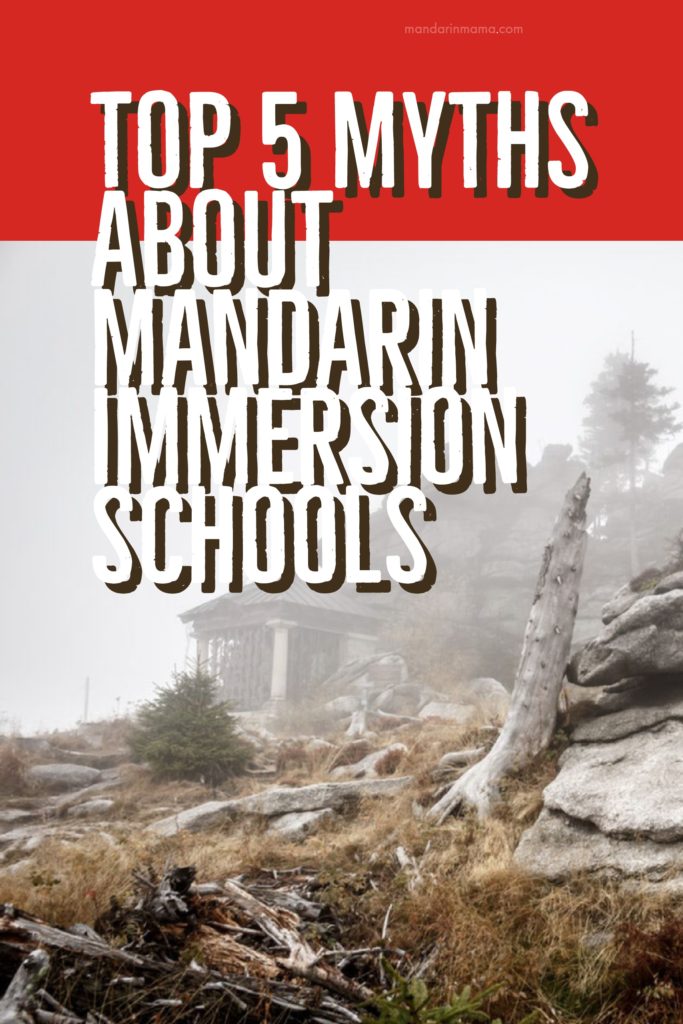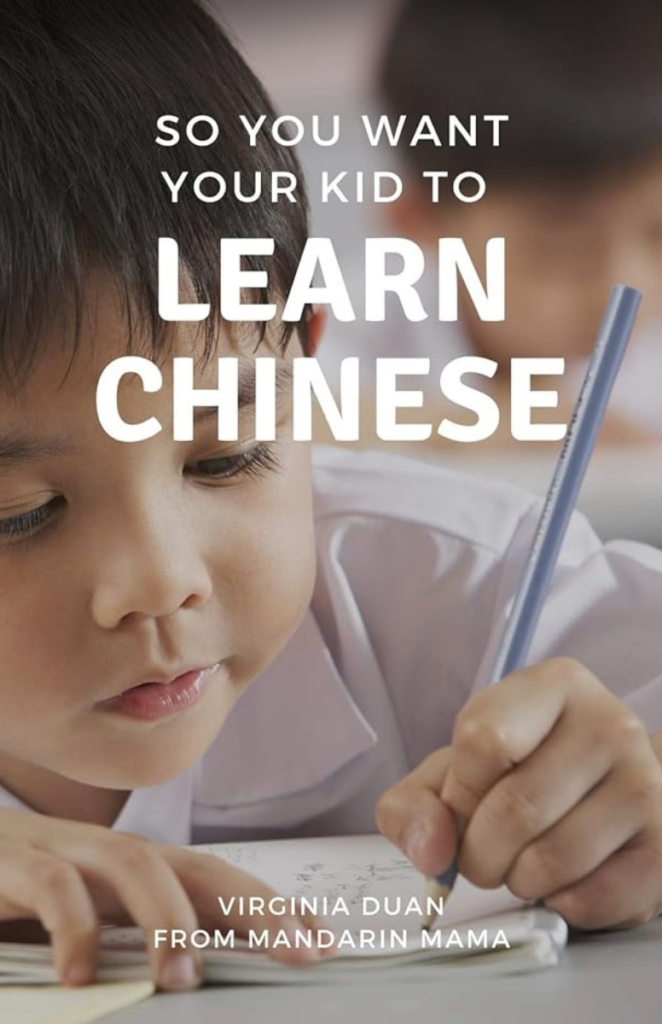I would like to say that I’m a practical and reasonable person. (Well, except when I’m not. But then, aren’t we all?) I totally understand that everyone who wants their kids to learn Chinese is NOT going to be homeschooling bilingually in Chinese and English. I get that for many folks, their best option for teaching their kids Chinese will be a local (or not so local) Chinese Immersion school. Despite what you may think, I consider Mandarin immersion school a totally legitimate option for many families. In some cases, perhaps the best option.

After all, depending on the program, your child will be surrounded by Chinese speaking adults all day and learn many subjects in Chinese as well as English. It’s a nice way to ease in newly immigrated children as well as teach a really hard language in a somewhat less arduous way.
However. (Aw, come on. You knew it was coming. Look at the title!)
I have found that many parents have misunderstandings about what a Mandarin Immersion program can and can not do.
Since I’m all about giving it to you for real (and, if I can have the petty pleasure of bursting some bubbles, too, then WIN WIN), I thought a quick post on the Top 5 Myths About Mandarin Immersion Schools would be helpful.
5) Kids in Mandarin Immersion Schools Fall Behind in English
Ok, this is kind of a misleading statement. The veracity of this statement depends on WHEN in the timeline you are stopping – and also depends on WHAT your home language is.
I will address the WHEN, first.
Depending on how your Mandarin Immersion school is set up (50/50, 80/20, 90/10, etc.), the English lag will probably exist for a moment. Most language immersion programs (it doesn’t matter what language) warn parents that their children’s English skills will be slightly behind English only students at the very beginning because that is when the foreign language percentage is highest.
But, as the children get older, the percentage of time in Chinese goes down and the English goes up. So any lags in English will be temporary. Furthermore, if your home language is English, then verbally and vocabulary-wise, your children aren’t really going to have a problem.
If you’re worried about reading in English, you can always supplement English reading at home. But honestly, English literacy is relatively easier than Chinese literacy and even if your child is behind, it’s something that immersion programs say most children catch up by the time they hit 6th grade.
If your home language is Chinese or something else, I can see how the English lag would be a bit more alarming. But again, most children will catch up and I wouldn’t worry unless the teachers are telling you to worry.
4) kids in Immersion School will speak Mandarin to the other children.
Ahh… if only this were the case. Sorry, friends. This is not true.
At best, the playground language will be some weird Chinglish dialect unique to your immersion school. But most likely, it will be English. Why? Because at least half the students will not be fluent in Chinese. And since almost all the children will be able to speak English, that will be the lingua franca of the playground.
3) Kids in Immersion School will be at grade level in Chinese to their counterparts in China/Taiwan.
No.
That is simply not possible.
Why not? Because the children in China and Taiwan are LITERALLY immersed in Mandarin. Their daily lives are 100% in Chinese. Everywhere they go, everything is Chinese. There is no way your child, even in a 100% Chinese environment at school, will be in the same environment.
Furthermore, if you look at what most Chinese immersion schools are promising in terms of characters/words learned per year, there is no way your children will be at grade level in China or Taiwan.
Here are some of the facts: most Mandarin Immersion schools in the US promise to teach your children 100-150 characters a year for 5-6 years. That is a range of about 500-900 characters at the end of their term, assuming 100% retention. Keep in mind, this does not even include writing characters.
In Taiwan, for the 1st grade, they are expected to know 400-600 characters. By 2nd grade, they are expected to know 800-1200 characters. In China, by the end of 2nd grade, they are expected to know 1600 characters.
To expect your children to be on grade level of native students is just not realistic.
2) Your children will be literate in Mandarin at the end of IMmErsion School
Sadly, because of Myth #3, your child will also not be literate in Chinese after 5-6 years in the Mandarin immersion school. If your school is teaching kids 100-150 characters a year and functional literacy (what you need to read a newspaper) is ~2,000-3,000 characters, the math just doesn’t work out.
Even if your kid is in the Chinese Immersion school for all 12 years of school, at the rate of 100-150 characters/words a year, even then, that is not enough to get to functional literacy.
There is no way to have your child be functionally literate in Chinese through Mandarin Immersion school alone.
1) Your children will be fluent in Chinese
I’m going to be real with you.
Unless your child comes from a heritage speaking family and/or you hire a tutor, your child will not be fluent in Chinese.
This is not a knock against the Mandarin Immersion school, their curriculum, or even your child’s abilities. But you have to have realistic expectations as well as an understanding of what fluency means.
Your child may be pretty good at speaking Chinese – and even be able to have short conversations. So, your child might likely be proficient in that they are able to convey simple thoughts or understand someone when they’re speaking Mandarin at a normal pace of speech.
But proficiency is not fluency.
Fluency requires a wider breadth of vocabulary, ability to understand cultural context and nuance, and the ability to communicate in most situations.
And maybe I’m just being a nit-picky jerk. That’s totally possible. However, if you have some grand dreams of your child someday being able to go get a job in China or Taiwan with their current level of Chinese, that’s not likely.
Their Chinese abilities are probably good for a kid learning a foreign language in an English speaking country. But let’s not conflate their abilities with a native kid of the same age and grade.
It won’t even be close.
Again, I share with you these myths not to discourage you from having your children in Chinese Immersion schools. Like I said before, I think they’re an easy and plausible way for many families to expose their children to Chinese – as well as have their children learn the basics of the language.
I just believe that forewarned is forearmed. Having appropriate expectations is the key to being happy with your Mandarin Immersion school experience.
If you would like to learn more about how your child can learn Chinese, check out my book, So You Want Your Kid to Learn Chinese. It’s full of practical advice, detailed applications, and heavy amounts of snark. This book is for every parent who wants their kid to learn Chinese and is willing to supplement and provide the necessary support that their child will need.






